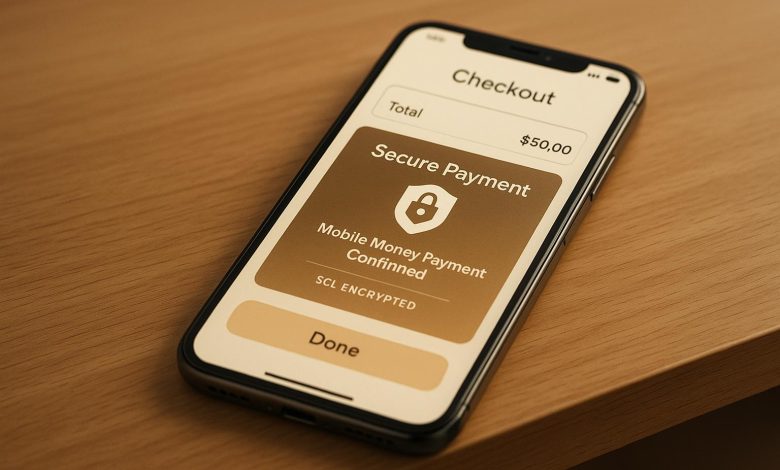Mobile Money Security for E-Commerce Platforms

Mobile money is transforming e-commerce, especially in regions with limited access to traditional banking. But security remains a top priority. Platforms like M-PESA, MTN Mobile Money, Airtel Money, JumiaPay, and Orange Money employ advanced measures like encryption, fraud detection, and multi-factor authentication to protect user data and transactions.
Key Takeaways:
- M-PESA: Strong encryption (SHA-256), PIN-based authentication, reliable but limited to certain markets.
- MTN Mobile Money: Multi-factor authentication, real-time fraud monitoring, broad regional coverage.
- Airtel Money: Bank-grade encryption, simple integration, but newer to the market.
- JumiaPay: Designed for e-commerce, AI-powered fraud detection, SSL encryption.
- Orange Money: Multi-layered security with SMS verification and advanced encryption.
When selecting a mobile money gateway, businesses should evaluate security features, ease of integration, and fraud prevention tools. The right choice balances protection with a smooth user experience.
User Authentication
M-PESA ensures secure transactions through a PIN authentication system that safeguards access to user accounts. This process ensures that only authorized individuals can approve e-commerce transactions. In addition to PIN-based security, M-PESA incorporates strong encryption protocols to further protect user data and transaction integrity.
Transaction Encryption
Sensitive data, such as phone numbers, identification details, and transaction records, is protected through advanced encryption methods. These measures secure financial information throughout the entire transaction process, from initiation to completion. One standout feature is Safaricom‘s use of the SHA-256 hashing algorithm in its Customer to Business (C2B) API. This method converts phone numbers into a 256-bit hash, ensuring confidentiality.
“Safaricom has implemented the use of SHA-256 hashing for customer phone numbers in their Customer to Business (C2B) API.”
The SHA-256 algorithm, originally developed by the National Security Agency, is widely recognized as a critical component of modern encryption systems, offering a high level of cryptographic security.
User Authentication
MTN Mobile Money uses strong authentication methods to control account access and protect user identities. Paired with advanced encryption, these measures create a solid shield against unauthorized access.
Transaction Encryption
To keep financial data safe, MTN encrypts all information during transmission. This ensures sensitive details stay secure throughout the platform.
Fraud Detection and Regulatory Compliance
MTN Mobile Money goes beyond basic security by actively monitoring transactions to detect and prevent fraud. With real-time systems in place, unusual transaction patterns are flagged immediately. The platform also complies with regulatory requirements, ensuring every transaction is traceable and secure. These measures work together to make MTN Mobile Money a reliable choice for e-commerce transactions.
Mobile Money: Hacking, Fraud & How to Build Protection
You can access Airtel Money through the Airtel Thanks app, making it a convenient option for managing your finances. Airtel Finance uses advanced bank-grade encryption to safeguard every transaction from start to finish, ensuring your data and money stay secure. This level of protection aligns with other leading mobile money services, providing a reliable and secure platform for e-commerce transactions.
sbb-itb-dd089af
Building on the security foundations set by platforms like M-PESA and MTN Mobile Money, JumiaPay adds its own layer of protection to e-commerce transactions. As the payment service for Jumia, it prioritizes safety with strong encryption, fraud prevention tools, and strict adherence to regulatory standards.
Transaction Encryption
JumiaPay employs SSL encryption to secure all payment data. This ensures that any information exchanged between a user’s device and JumiaPay’s servers remains encrypted during transit. Even if intercepted, the data would be unreadable. Additionally, sensitive payment details are kept hidden from merchants during transactions, minimizing the risk of data exposure.
Fraud Detection
To combat fraud, JumiaPay utilizes AI-driven real-time monitoring to flag suspicious activity, such as unusual spending patterns or geographic inconsistencies. It also includes proactive tools to detect and prevent common e-commerce scams, offering users an added layer of protection.
Regulatory Compliance
JumiaPay complies with rigorous regulations by implementing standard security protocols that safeguard customer data and reduce fraud risks. As Jumia CEO Francis Dufay noted, “protecting customer trust through robust data security is vital for growth and investor confidence”.
Orange Money takes security seriously, employing multiple layers of protection to ensure safer e-commerce transactions. With features like multi-step authentication, SMS verification, and advanced encryption, the platform prioritizes user safety at every stage.
User Authentication
Before initiating any transaction, users must log in to their Orange Money wallet, ensuring an initial layer of security. Each transaction is further safeguarded with mandatory PIN verification.
To add another layer of protection, Orange Money uses SMS confirmation. Users receive transaction details via SMS and must verify them using their registered mobile number. In cases where funds need recovery, access is granted only after replacing the SIM card and presenting a valid ID.
Transaction Encryption
Orange Money relies on a strong encryption framework to secure payment data. It uses the advanced Comviva mobiquity® Pay platform, which ensures that all transaction details are encrypted during both transmission and storage. This enterprise-level system provides an added layer of protection against data breaches.
Regulatory Compliance
The platform is designed to meet stringent financial regulations, adhering to local banking and telecommunications standards. Its security system includes session management tools that monitor user activity and automatically end inactive sessions to prevent unauthorized access. According to The Fast Mode:
“Additionally, its advanced security features – including robust authentication and authorization modules, as well as session management capabilities – strengthen fraud prevention measures, ensuring a secure environment for Orange Money users.”
These features make Orange Money a strong choice for e-commerce platforms looking for secure mobile payment solutions that prioritize user protection.
Advantages and Disadvantages
When it comes to mobile money gateways, each one brings its own mix of strengths and challenges, particularly in terms of security, ease of integration, and fraud prevention. Understanding these nuances can help businesses select the best fit for their e-commerce needs.
| Gateway | Security Advantages | Security Disadvantages | Integration Ease | Fraud Prevention |
|---|---|---|---|---|
| M-PESA | Strong encryption protocols, compliance with regulatory standards, proven track record | Limited geographic reach; higher integration costs for smaller platforms | Moderate – requires technical expertise | Advanced fraud detection technologies |
| MTN Mobile Money | Multi-factor authentication, PIN verification, and broad network coverage | Inconsistent security protocols across regions | Relatively easy – user-friendly integration tools | Effective transaction monitoring and verification methods |
| Airtel Money | Fast transaction processing and growing popularity | Newer platform with a less-established security reputation; relies on basic fraud measures | Very straightforward – streamlined API integration | Standard PIN-based fraud prevention |
| JumiaPay | Built for e-commerce, offering seamless checkout and merchant-focused tools | Limited third-party integration options due to its specialized ecosystem | Efficient – tailored for e-commerce | Fraud detection designed for online shopping patterns |
| Orange Money | Proprietary platform with strong session management and encryption | Smaller market presence in some areas; complex implementation | Moderate – may need specialized technical knowledge | Multi-layered authentication and session management |
Choosing the right gateway involves more than just comparing features in a table. Businesses also need to consider factors like transaction fees, which can vary depending on the level of security offered, as well as geographic coverage and how each gateway aligns with regional regulations. The technical complexity of integration is another key point – some platforms require advanced expertise, while others offer simpler solutions. Additionally, the effectiveness of fraud detection systems and the ability to scale with growing e-commerce needs are critical for long-term success. Balancing these elements can ensure both security and operational efficiency.
Conclusion
Mobile money gateways each bring their own approach to security. Some focus on strong encryption paired with regulatory compliance, others highlight multi-factor authentication and smooth integration, while certain options cater specifically to e-commerce challenges.
As e-commerce expands and cyber threats grow more sophisticated, updating tools like real-time monitoring, fraud detection systems, and encryption protocols is no longer optional – it’s essential. Businesses need to regularly evaluate their payment gateway choices to keep up with these shifting risks.
At the heart of mobile money security is finding the right balance: offering solid protection without sacrificing a smooth user experience. Companies should choose gateways that meet their unique needs and keep an eye on industry developments to maintain a secure footing.
FAQs
How do mobile money platforms keep e-commerce transactions secure?
Mobile money platforms prioritize security to safeguard e-commerce transactions. They rely on technologies like tokenization and encryption to protect sensitive payment details. Tokenization replaces payment data with secure, non-sensitive tokens, while encryption ensures that data remains unreadable during transmission, reducing the risk of breaches.
Additionally, platforms use multi-factor authentication (MFA) and biometric verification to verify user identities. These measures add layers of protection, making it harder for unauthorized users to gain access.
Many platforms also generate device-specific cryptograms for transactions. These cryptograms link payment data to a particular device, adding an extra layer of security. Together, these technologies work to protect customer information, prevent fraud, and provide a safer online shopping experience.
What should businesses look for in a mobile money gateway for their e-commerce platform?
When you’re choosing a mobile money gateway for your e-commerce platform, start by focusing on security. Make sure it complies with PCI DSS standards and offers strong fraud prevention tools to protect your transactions and customer data.
Next, take a close look at the costs. Evaluate transaction fees and any recurring charges to see if they align with your budget. Hidden fees can add up quickly, so it’s worth digging into the details.
You’ll also want a gateway that supports various payment methods. This ensures you’re catering to your customers’ preferences while staying compatible with your current systems. Lastly, prioritize gateways with seamless API integration. This makes operations smoother and helps create a hassle-free experience for your customers.
What fraud prevention measures do mobile money services offer for e-commerce platforms?
Mobile money services rely on several security measures to keep transactions safe on e-commerce platforms. These include transaction monitoring, anomaly detection, and multi-layered authentication to spot and block any unusual or suspicious activity. Using advanced systems powered by artificial intelligence, they can analyze transaction patterns in real time to identify potential fraud.
On the e-commerce side, essential security features like encryption (SSL/TLS), tokenization, and PCI DSS compliance work to safeguard sensitive customer information during transactions. Together, these tools form a robust defense system, addressing the specific risks associated with mobile payments and online shopping.









